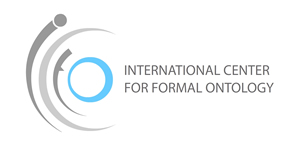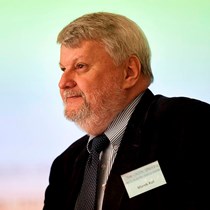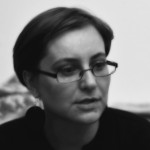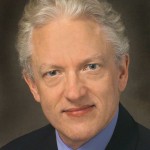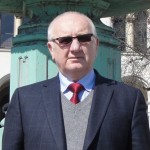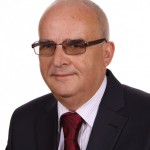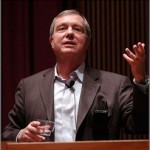Internal members
(scholars employed at the Warsaw University of Technology)
Andrzej Biłat is a professor of philosophy at the Warsaw University of Technology. His main field of research is formal philosophy, especially philosophical logic, philosophy of formal sciences, and formal ontology. He is the author of four books and over sixty papers. PI of four research projects (KBN, MNiSW and NCN). Since December 2015 – editor-in-chief of the “Studia Semiotyczne“. He is a member of the ICFO Council as a representative of the Faculty of Administration and Social Sciences, Warsaw University of Technology.
Hajo Greif is a philosopher working in the field of history, philosophy, and social studies of science and technology. Hajo Greif works as a research assistant professor at the Faculty of Administration and Social Sciences at Warsaw University of Technology. His philosophical work focuses on evolutionary and computational accounts of cognition. Key topics include situated cognition and cognitive artefacts (‘4E’ cognition, smart environments); naturalism in the philosophy of mind (teleosemantics, evolution of cognition); history and philosophy of cognitive science (AI vs cybernetics). All strands of his work share the leitmotif of evolutionary naturalism, broadly construed. These strands converge in his “habilitation” project (that peculiar Germanic “second PhD”), which was completed in 2015. The thesis is titled “Environments of Intelligence“, and presents a take on the role of the environment, and of the natural information it provides, in human cognition. Particular attention is paid to the cognitive bearing of technologies known as ‘smart environments’. For more information see the website: https://hajo-greif.net/. He is a member of the Philosophy of Computing research group at the ICFO.
Zbigniew Król is a philosopher who works at the Department of the Philosophy of Science, Sociology and Foundations of Technology, Faculty of Administration and Social Sciences, Warsaw University of Technology, and at the two departments of the Institute of Philosophy and Sociology, Polish Academy of Sciences: the Department of Inquiries on Ancient Philosophy and the History of Ontology. His research concerns hermeneutics, the hermeneutical philosophy of mathematics and science, the history of mathematics and science, logic, mathematics, ontology and epistemology. He is an author of many papers and three monographs: Plato and the Foundations of Modern Mathematics: the Concept of Number by Plato (2005), Mathematical Platonism and Hermeneutics (2006) and Platonism and the Development of Mathematics. Infinity and Geometry (2015). He is the dean of the Faculty of Administration and Social Sciences of the Warsaw University of Technology and a member of the ICFO Program Council.
Marek Kuś is a professor at the Warsaw University of Technology, Faculty of Administration and Social Sciences and professor at the Centre of Theoretical Physics of the Polish Academy of Sciences in Warsaw. He is a theoretical physicis. He is the director of the International Center for Formal Ontology. He is a member of Academia Europea. His scientific interests include: mathematical physics, in particular the application of geometric and group-theoretic methods (simplectic geometry, algebraic geometry, Lie group theory) in quantum computer science, quantum chaos and the basics of quantum mechanics. He is also interested in formal methods in philosophy and the application of methods of exact sciences in humanities. He is the author of over 150 original articles.
Józef Lubacz was a professor at the Warsaw University of Technology, Faculty of Electronics and Information Technology for over 40 years. He is currently a research professor at the Faculty of Administration and Social Sciences. He holds degrees in engineering and mathematics. Although most of his research activity was focused on Information and Communication Technology (ICT), during the last two decades he also conducted research on non-technological aspects of ICT and Information Society, philosophy of science and technology, and on epistemic and poietic processes. At the Warsaw University of Technology he served as the head of the Division of Teleinformatics (1987-2002), the dean of the Faculty of Electronics and Information Technology (2002-2005); the director of the Institute of Telecommunications (2008-2016). For many years he was a member of the Committee of Electronics and Telecommunications of the Polish Academy of Sciences. He was elected the chairman of the General Council for Science and Higher Education of Poland for the 2010-2013 term. He chairs the ICFO Program Council.
Roman Z. Morawski (*1949) is Professor of Measurement Science at Warsaw University of Technology. His research contributions (more than 50 projects, over 200 publications and patents) are mainly concerned with measurement data processing in biomedical engineering; he has authored, in particular, a monograph entitled Methods for Measurement Signal Reconstruction (1989) and a fundamental paper “An application-oriented mathematical meta-model of measurement” (Measurement, 2013). His academic interests include, moreover, the issues related to organisation of higher education, research methodology and research ethics; he has authored ca. 100 publications in this area, in particular – two books: Ethical Aspects of Research in Empirical Sciences (Warsaw University Press, 2011) and Technoscientific Research: Methodological and Ethical Aspects (Walter De Gruyter, 2019).
Bartłomiej Skowron is a platonic philosopher. He wrote his Ph.D. thesis on Mereotopological aspects of philosophical part-whole theory at the University of Wrocław, and defended his thesis in 2012. He received also BA in Mathematics from the University of Wrocław, Faculty of Mathematics and Computer Science, in 2011. He is interested in mathematical philosophy (in particular in formal ontology and topological philosophy, theory of ideas, category theory), phenomenology and ethics. He was elected a fellow of the Academy of Young Scholars and Artists in 2012. He received the Burgen Scholarship in 2013 from the Academia Europaea. Since 2015 he is an assistant professor at the Faculty of Administration and Social Sciences at the Warsaw University of Technology. Since 2017 he serves as Vice-Dean for Research. In 2019 he edited three books: Polish Contemporary Ontology (De Gruyter), Category Theory in Physics, Mathematics, and Philosophy (with Marek Kuś) (Springer Proceedings in Physics) and Virtual Objects (with Paweł Stacewicz) (Warsaw University of Technology publishing house). Most of his articles are available here. He is a member of the ICFO Program Council.
Paweł Stacewicz is a philosopher, computer scientist, popularizer of mathematics. In 1993 he graduated from the Faculty of Technical Physics and Applied Mathematics (WUT), in 1993-2000 he cooperated scientifically with the Institute of Computer Science Basics (PAS), in 2009 he defended his doctorate at the Faculty of Philosophy and Sociology (UW), in 2010 and 2011 he published two monographs on the philosophy of computer science, in 2013 he started working as an assistant professor at the Faculty of Administration and Social Sciences of WUT. His current interests focus on: philosophy of computer science, worldview of computer science, philosophy of mind, research on artificial intelligence and mathematical basics of computer science. Since 2011 he is co-editing – together with Professor Witold Marciszewski – the academic blog “Cafe Aleph” (blog.marciszewski.eu), where he published and discussed a number of texts from the borderland of philosophy, computer science and mathematics. He is a member of the Philosophy of Computing research group at the ICFO.
Michał Stelmach is a philosopher. He defended his doctoral dissertation On Wittgensteins Transcendental Logic in 2015. He is interested in phenomenology, philosophy of dialogue and analytical philosophy. In his work he focuses mainly on the fields of ontology, logic, epistemology and ethics. Especially interested in the formal ontology of Roman Ingarden. Michał Stelmach is the author of works on the philosophy of Ludwig Wittgenstein (e.g. Wittgenstein and apriori [2010], The Nature and Basics of Wittgenstein’s Meta-Science (2011), On Wittgensteins Transcendental Logic. Logic-philosophical studies [2018]). He has published several articles and chapters in monographs on values, arguments, war ontology, and philosophy in psychiatry. He is also interested in theology (especially mystical theology) on the one hand, and science (and their interaction) on the other.
Antonio Vassallo is an assistant professor at the Warsaw University of Technology, Faculty of Administration and Social Sciences. He holds a M.Sc. in physics from the University of Catania, and a Ph.D. in philosophy from the Universities of Lausanne and Warsaw. Not surprisingly, he is interested in investigating the conceptual issues lying at the intersection between physics and philosophy. In particular, his research has so far dealt with the metaphysical issues related to spacetime in general relativity and quantum gravity, and the debate regarding the interpretations of quantum theory (with a special focus on the primitive ontology approach to quantum physics). He is the principal investigator in the research project “Self-subsisting structures in quantum gravity“, funded by the Polish National Science Centre (OPUS grant 2019/33/B/HS1/01772). He is also a member of the Philosophy of Physics research group at the ICFO.
Paula Quinon is a research assistant professor at the Faculty of Administration and Social Sciences at Warsaw University of Technology. Paula Quinon’s competences include philosophy of mathematics, philosophy of language, epistemology, logic and cognitive science; she also holds a Master of Arts degree. Her latest article, Can Church’s thesis be viewed as a Carnapian explication? was published in Synthese. She is a member of the Philosophy of Computing research group at the ICFO.
Olena Yaskorska-Shah is an assistant professor at the Faculty of Administration and Social Sciences at Warsaw University of Technology. Yaskorska completed her PhD degree in 2017 at the Institute of Philosophy and Sociology at the Polish Academy of Sciences. Her interests focus on argument ontology in a dialogue and it’s practical applications. She participated in research projects funded by National Science Centre and Swiss program Sciex within which she collaborates with research centres from Great Britain, Switzerland, France and Germany. The project of her PhD thesis was funded by the National Science Centre in program Etiuda2. Her main publications belong to the topic of formal modelling different types of conversations. For example, a paper on natural and formal dialogues can be found in Argumentation, on finance dialogues in Frontiers in Artificial Intelligence and Applications.
Frank Zenker is a research assistant professor at the Faculty of Administration and Social Sciences at the Warsaw University of Technology. He works in Social Epistemology, Cognitive Science, and the Philosophy of Science. Most of his ongoing research deals with overcoming the replication crisis in the empirical social and behavioral sciences, on which he leads a corresponding research project. He has attracted funding for several research projects, has published widely in international peer-reviewed journals, and maintains a wide ranging network of international contacts, including scholars in North America, Europe, and China, where he visits on a regular basis. Among others, he currently leads the workgroup on norms of public argument of the EU COST Action APPLY, European Network for Argumentation and Public Policy Analysis (CA17132), co-organizes the international section of the Symposium on Reasoning, Argumentation, and Communication at SWUFE, Chengdu, PRC. He is also a steering committee member of the European Conference on Argumentation (ECA). Click her for his pre-prints and a CV.
Tomasz Bigaj (PhD in philosophy in 1996, University of Warsaw) is an associate professor at the Institute of Philosophy, University of Warsaw, Poland, and a Marie Curie visiting fellow at the University of Bristol. He was a Marie Curie fellow at the University of California, San Diego, USA, and a visiting Fulbright fellow at the University of Michigan, Ann Arbor, USA. His recent research focuses on selected topics in the metaphysics of quantum mechanics, including the counterfactual analysis of quantum non-locality and causality, the dispositional interpretation of quantum properties, and the problem of identity and indiscernibility in philosophy and physics. Among his publications are: the book Non-locality and Possible Worlds. A Counterfactual Perspective on Quantum Entanglement (Ontos Verlag 2006), the edited volume (with Christian Wüthrich) Metaphysics in Contemporary Physics (Brill/Rodopi 2016), and over forty articles in Polish and international journals and collections of essays (including Journal of Philosophical Logic, Synthese, Erkenntnis, Ontology of Spacetime II, Studies in History and Philosophy of Modern Physics, Metaphysica, Philosophy of Science, Poznań Studies in the Philosophy of the Sciences and the Humanities, and Foundations of Science). Bigaj’s recent publications can be found here: https://uw.academia.edu/TomaszBigaj .
Gabriele De Anna is currently juniorprofessor of Philosophy at Bamberg University, in Germany. He received two PhDs in Philosophy, one from the University of Padua (Italy) and one from the University of St Andrews (Scotland), after completing a Laurea degree (Padua) and Master of literature (St Andrews). He was Visiting Student at the University of Santa Barbara (USA), Visiting Fellow at the Centre for Philosophy of Science at the University of Pittsburgh (USA), Marie Curie Fellow at the Centre for Research in the Arts, Social Sciences and Humanities at the University of Cambridge (England), and First Chair of Philosophy at the University of Bamberg (Germany). He wrote over thirty articles in professional journals and collective volumes, and six monographs, including Scienza, Normativita, politica. La natura umana tra l’immagine scientifica e quella manifesta, Milan: Franco Angeli, 2012, Azione e Rappresentanza. Un problema “metafisico” del liberalismo contemporaneo, Naples: Edizioni Scientifiche Italiane, 2012. He has edited seven volumes, including Willing the Good. Empirical Challenges to the Explanation of Human Behaviour, Necastle: Cambridge Scholars Publishing, and Evolutionary Ethics and Contemporary Biology, Cambridge, Cambridge University Press, 2006 (with G. Boniolo).
Director of the Institute of Philosophy at the Polish Academy of Sciences, Warsaw. He is a member of the ICFO Program Council.
Michał Głowala is an assistant professor at the Institute of Philosophy, University of Wrocław. His research concerns mainly scholastic metaphysics (especially the metaphysics of powers and the metaphysics of action in late scholasticism) in the context of contemporary analytical metaphysics (in particular the metaphysics of powers). His recent publications include Singleness. Self-Individuation and Its Rejection in the Scholastic Debate on Principles of Individuation (forthcoming in de Gruyter), Power Individuation: A New Version of the Single-Tracking View („Metaphysica” 16 (2015), issue 2), Unity and Plurality in Joint Manifestations of Powers: A Scholastic Approach („Revista Portuguesa de Filosofia” 71 (2015), issue 4), How do Powers Tend toward Their Manifestations? Three Thomistic Theories of the Prevention of Powers (in Analytically Oriented Thomism, ed. M. Szatkowski (2016)).
Joanna Golińska-Pilarek is an assistant professor at the Institute of Philosophy, University of Warsaw. Her research interests are focused on logic and its applications, in particular in philosophy, mathematics, cognitive and computer sciences, among others. Recently, she works on logics for qualitative reasoning and their (relational) dual tableaux, non-Fregean logics with identity and equimeaning connectives. She published in leading international journals (Annals of Pure and Applied Logic, Logic Journal of IGPL, Fuzzy Sets and Systems, Studia Logica, Mathematical Logic Quarterly, Journal of Philosophical Logic, Notre Dame Journal of Formal Logic). She has also co-authored a comprehensive survey monograph Dual Tableaux: Foundations, Methodology, Case Studies published in Springer (2011). She is currently conducting a large project on logics for qualitative reasoning funded by the Polish National Science Centre within program MAESTRO (see www.logicsforqr.uw.edu.pl). In the ICFO Council she represents the Faculty of Philosophy and Sociology of the University of Warsaw. Homepage: www.joannagolinska.com.
Christian Kanzian is a professor of philosophy at the University of Innsbruck, Austria. His research concerns analytical philosophy, especially analytical ontology, history of philosophy (Kant). The list of his monographies includes: Grundproblerne der Analytischen Ontologie (with E. Runggaldier, 1998), Ereignisse und andere Partikularien (2001), Ding – Substanz – Person. Eine Alltagsontologie (2009). 2016 will appear his Wie Dinge sind. Editions (selection): Substance and Attribute (together with Legenhausen 2007), Persistence (2008), How Things Are (together with Loffler, Quitterer 2011). Kanzian has published more than seventy articles, mainly to ontological topics. He is a President of the Austrian Wittgenstein Society. Homepage: http://www.uibk.ac.at/philtheol/kanzian/person/index.html.en.
Srećko Kovač is a professor of logic at the Institute of Philosophy (Zagreb, Croatia). His research concerns philosophical logic (Logical Structures and Intentionality; Logic, Language and Modalities). He is the author of Logical Questions and Procedures (with B. Žarnić, 2008), Logical-Philosophical Papers (2005), Logic (1994, 2nd ed. 2004), and Logic as a “Demonstrated Doctrine” (1992), in Croatian. He has published about 40 papers in international and Croatian journals and collections of papers. His current interests include logic of belief and knowledge, logic and ontology, logic of group decision-making, and history of logic.
Witold Marciszewski. Born 1930. Ph.D. 1959. Habilitation 1970 with dissertation on the logical theory of beliefs. Professor 1979. LECTURED mainly at the University of Warsaw. Visiting Professor: Halle 1974; Salzburg University, 1987. ESTABLISHED: in 1975 – university department of Logic and Informatics; 1980 – the quarterly “Studies in Logic, Grammar and Rhetoric“; 2011 – academic blog “Cafe Aleph” to discuss logical and ontological aspects of computer science. Co-edited and co-authored with Paweł Stacewicz. Published by a Foundation (promoting studies in computer science) in collaboration with the Warsaw University of Technology. SUPERVISED: in 1986-1990 the Polish national project “Logical Systems and Algorithms for Automated Proof-Checking”. MAIN PUBLICATIONS: “Dictionary of Logic: Concepts, Methods, Theories” (editor, author of the half of size), Nijhoff 1981. “Categorial Grammar” (co-edtitor and co-author), Benjamins 1988. “Logic from a Rhetorical Point of View“, de Gruyter 1994. “Mechanization of Reasoning in a Historical Perspective” (co-author R.Murawski), Rodopi 1995. His studies in FORMAL ONTOLOGY concern mainly the ontology of Leibniz: lectures in Salzburg, papers delivered at Leibniz Congresses, publications in “Studies…” etc. He is a member of the ICFO Program Council.
Jason L. Megill finished his Ph.D. in philosophy at the University of Virginia in December 2008. For the 2008-2009 academic year, he taught at the University of Colorado-Boulder. During 2009-2010, he taught at Old Dominion University. His areas of specialization are philosophy of mind, early modern philosophy and philosophy of religion. He is also interested in metaphysics and formal logic. Somme publications: (with Josh Mitchell), “A Modest Modal Ontological Argument.” Ratio 22.3: 338-349 (2009); “Naturalism, Physicalism and Epiphenomenalism.” Philosophical Psychology 20.6: 681-686 (2007); “Locke’s Mysterianism: On the Unsolvability of the Mind-Body Problem.” Locke Studies 5: 119-148, (2005); (with Jon Cogburn) “Easy’s Getting Harder All the Time: The Computational Theory of Mind and Affective States.” Ratio 17.3: 306-316, (2005). More info: https://sites.google.com/site/jasonlmegill/home.
Uwe Meixner is a professor of philosophy at the University of Augsburg, Germany. He previously was bound up with the University of Regensburg (till 2010) and earned his doctorate from that university in 1986, under the direction of Franz von Kutschera. His main fields of research are theoretical philosophy (especially, logic, metaphysics, and philosophy of mind) and the history of philosophy. Uwe Meixner is the author of twelve books: Handlung, Zeit, Notwendigkeit: Eine ontologisch-semantische Untersuchung (1987), Ereignis und Substanz: Die Metaphysik von Realität und Realisation (1997), Axiomatic Formal Ontology (1997), Theorie der Kausalität: Ein Leitfaden zum Kausalbegriff in zwei Teilen (2001), The Two Sides of Being: A Reassessment of Psycho-Physical Dualism (2004), Einfuhrung in die Ontologie (2004), David Lewis (2006), The Theory of Ontic Modalitie (2006), Modalität: Möglichkeit, Notwendigkeit, Essenzialismus (2008), Philosophische Anfangsgründe der Quantenphysik (2009), Modelling Metaphysics: The Metaphysics of a Model (2010), Defending Husserl. A Plea in the Case of Wittgenstein & Company vs. Phenomenology (2014). He has published over 100 articles, and is a co-editor of two journals: Logical Analysis and History of Philosophy and Metaphysica. He is a member of the ICFO Program Council.
Marek Piwowarczyk is an assistant professor at the Faculty of Philosophy, John Paul II Catholic University of Lublin. His main field of research is ontology. Occasionally he investigates some problems of philosophy of religion. His recent book “Podmiot i własności. Analiza podstawowej struktury przedmiotu” (“Subject and Properties. The Analysis of the Fundamental Structure of Object”) is devoted to various aspects of subjectproperties structure.
Giuseppe Primiero is Associate Professor of Logic at the Department of Philosophy, University of Milan (Italy). He acts as President of the DHST Commission for the History and Philosophy of Computing (HaPoC) and Secretary General of the Association Computability in Europe (CiE). His research interests are primarily in Logic and Computation, Philosophy of Computing and Information. He is a member of the Philosophy of Computing research group at the ICFO. More info: https://sites.unimi.it/gprimiero/.
Francesco Orilia studied at the University of Palermo (M.A. in philosophy, 1979) and at Indiana University, Bloomington (Ph.D. in Philosophy, 1986). He is a professor of philosophy at the Università of Macerata, where he teaches classes in philosophy of language, logic, analytic ontology and philosophy of mind. His main research interests are in analytic ontology and the philosophy of language, time, mind and logic. He is the author of several books, including Singular reference. A descriptivist approach (Springer, Dordrecht, 2010), and many articles in refereed international journals such as Dialectica, Journal of Philosophical Logic, Journal of Symbolic Logic, Notre Dame Journal of Formal Logic, Philosophical Studies, Synthese. His website is at http://docenti.unimc.it/francesco.orilia?set_language=en&cl=en. He is one of the ICFO Mentors.
Paweł Polak – professor of philosophy at Pontifical University of John Paul II in Cracow, studied telecommunication at Cracow University of Technology (AGH) and philosophy at Pontifical Academy of Theology. Editor-in-chief of periodical ‘Philosophical Problems in Science (Zagadnienia Filozoficzne w Nauce)”, member of Commission on the History of Science of the Polish Academy of Arts and Sciences, secretary of the Commission on the Philosophy of Science (the same Academy); published in „Studies in Logic, Grammar and Rhetoric”, „Foundations of Computing and Decision Sciences”, „Studia Historiae Scientiarum”, „Studia Metodologiczne”. He published books about philosophical aspects of scientometrics and about philosophical reception of Special and General Relativity in Lwów. His interests in philosophy of science include the history and philosophy of computing/informatics, pancomputationalism, history of Polish philosophy, he is also interested in applied philosophy (machine ethics and wine philosophy). He is a member of the Philosophy of Computing research group at the ICFO.
Peter Simons studied at the University of Manchester, and has held teaching posts at the University of Bolton, the University of Salzburg, where he is Honorary Professor of Philosophy, and the University of Leeds. He has been President of the European Society for Analytic Philosophy and is current director of the Franz Brentano Foundation. His research interests include metaphysics and ontology, the history of logic, the history of Central European Philosophy, particularly in Austria and Poland in the 19th and 20th centuries, and the application of metaphysics to engineering and other non-philosophical disciplines. He is the author of two books and over 200 articles. Peter Simons has been a Fellow of the British Academy since 2004, chaired their Philosophy Section from 2007-11, and is currently a member of their Council. In 2006 he was elected to the Academia Europaea and in 2013 to the Royal Irish Academy. Homepage: https://sites.google.com/site/petermsimons/. He is one of the ICFO Mentors.
Barry Smith is SUNY Distinguished Professor in theDepartment of Philosophy in the University at Buffalo, with joint appointments in the Departments of Biomedical Informatics, Computer Science and Engineering, and Neurology. He also serves as Director of the National Center for Ontological Research.
Smith’s research has been funded by the National Institutes of Health, the US, Swiss and Austrian National Science Foundations, the Volkswagen Foundation, the European Union, and the US Department of Defense. His work on the science of ontology led to the establishment of Basic Formal Ontology (BFO) as the most commonly adopted upper-level ontology development framework. It also led to the formation of the OBO (Open Biomedical Ontologies) Foundry, a suite of interoperable ontology modules designed to support information-driven research in biology and biomedicine. The methodology underlying BFO and the OBO Foundry is now being applied in a range of different domains, including defense logistics, military intelligence, sustainable development, and industrial engineering. He is a member of the ICFO Program Council.
Mirosław Szatkowski was a professor of philosophy at the Warsaw University of Technology, Poland. He was also associated with the Department of Philosophy, Theory of Science and Religious Studies at the Ludwig-Maximilians University in Munich, Germany. His fields of research are Logic, Foundations of Mathematics, and Formal Ontology (especially, ontological proofs for the existence of God). The following three papers give a good expression of his interests: [1]. ‘‘Semantic Analysis of some Variants of Anderson-like Ontological Proofs’’, in Studia Logica, 79(2005), pp. 317-355. [2]. ‘‘How to think about the correctness of theistic belief’’, in Metaphysica, 15(2014), pp. 47–68. [3]. ‘‘God’s Omniscience and Logical Virtue’’, in God, Truth, and other Enigmas, edited by M. Szatkowski, Walter de Gruyter, 2015, 99-116. He served as the first Director of the ICFO.
Kazimierz Trzęsicki is a professor of philosophy at the Faculty of History and Sociology, University of Białystok, Poland. His main fields of research are Logic, History and Philosophy of Science and Information Technology. He is a member of the ICFO Program Council.
Peter van Inwagen is a John Cardinal O’Hara Professor of Philosophy at the Department of Philosophy, University of Notre Dame. He is the author of eight books: Existence: Essays in Ontology (2014), The Problem of Evil (2006), Ontology, Identity, and Modality: Essays in Metaphysics (2002),
The Possibility of Resurrection and Other Essays in Christian Apologetics (1998), God, Knowledge and Mystery: Essays in Philosophical Theology (1995), Metaphysics (1993), Material Beings (1990), An Essay on Free Will (1983). He was the president of the Society of Christian Philosophers from 2010 to 2013. Most of Professor van Inwagen’s work is available at: http://andrewmbailey.com/pvi/. He is a member of the ICFO Program Council and one of the ICFO Mentors.
Achille C. Varzi is a professor of Philosophy at Columbia University, New York (USA). A graduate of the University of Trento (Italy), he received his Ph.D. in philosophy from the University of Toronto (Canada). His main research interests are in logic and metaphysics. He is an editor of The Journal of Philosophy, a subject editor of the Stanford Encyclopedia of Philosophy, and an associate or advisory editor of The Monist, Synthese, Dialectica, The Review of Symbolic Logic, and other journals. He also writes for the general public and contributes regularly to several Italian newspapers. Homepage: http://www.columbia.edu/~av72/. He is one of the ICFO Mentors.
